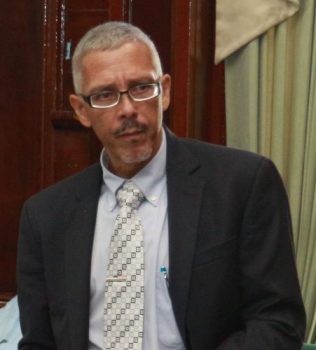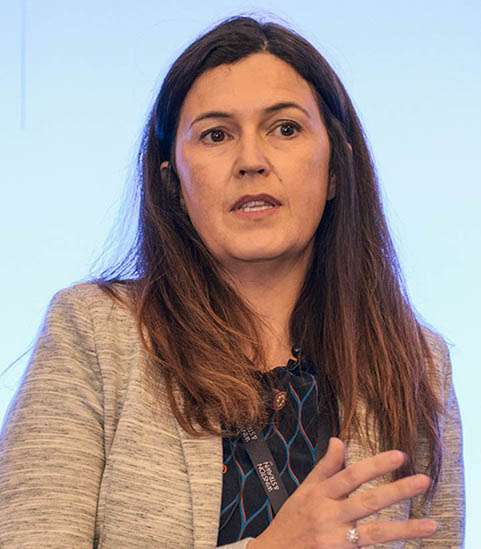Guyana’s green energy transformation could be realised if it doesn’t buckle to pressure for downstream investments in oil here and the country should instead focus on diversification, Chatham House fellow and oil consultant Valerie Marcel told Thursday’s Houston, Texas petroleum summit.
“There will inevitably be temptations to pursue a different course. There will be pressure to bring the oil to shore and to transform it in Guyana. There will be clamouring for a refinery. And probably for cheap oil and gas feedstocks to support Guyana’s industry, and subsidised gasoline and power for consumers. There will be political pressure to benefit from the physical oil,” Marcel said, during her presentation at the Guyana Petroleum Summit.
“We are in an energy transition and we know oil is not forever. We don’t know when oil demand will peak but industry views are broadly aligned around the idea that it will peak. What does this mean for Guyana? Essentially it means that it must reap benefits while it can, limit its dependence on the oil sector, invest in diversification, create long-term wealth and save for the future,” she said.

Marcel’s overview of the sector and advice for this country was made at the same forum at which former Minister of Business Dominic Gaskin assured that the government won’t make the mistakes of some oil producers and is implementing policies to avoid a dependence on fossil fuels.
“The government certainly sees oil as a means of transforming our economy and fast-tracking development. It sees great value in long-term partnerships between the country and the contractor, facilitated by government through a well-regulated industry. Our President certainly sees the importance of managing this sector responsibly, and has placed it under the supervision of a newly established Department of Energy within his Ministry,” Gaskin said during his feature address.
“I know that the government is committed to developing a green economy and to strengthening its agricultural, agro-processing, mining and forestry industries; and developing its tourism and services sectors. Because, as promising as it is, Guyana cannot afford to become completely dependent on oil or any other non-renewable resource. And, I’m also aware that government recognises the importance of ensuring that its depleting natural resources are replaced with sustainable human capital and a globally competitive economy,” he added.
Marcel and Gaskin were among a host of speakers at the summit, held in collaboration with the Bank of America, TOTALTEC and other oil industry companies.
Marcel, a researcher at the not-for-profit London-based think tank, is the project lead for the New Petroleum Producers Discussion Group – a peer-to-peer network of 31 emerging oil and gas producers – who share lessons learned with each other on how to navigate the first steps of developing oil and gas. The group does not have a policy view, nor does it advise governments to pursue specific policies. Rather it lays out policy options and, with the help of other emerging producers sharing their experience, it explains the risks and rewards associated with each policy option.
The consultant has been involved in the group since its founding in 2012 and told participants that it is from that vantage point that she has been able to witness the progression of Guyana; from exploration days, “when it was a frontier country, to discovery, to more discoveries, to development and soon to production.”
She said that through this time, the group has also seen the Government of Guyana establish its capacity, institutions, policies and regulations and that as time nears to first oil next year, this country can learn from emerging producers, especially the new producer countries, such as Ghana.
“Ghana has nine years production history. Unlike Saudi Arabia or Norway, which took the rein of their old sectors decades ago, Ghana remembers how it took the first steps in developing its capacity and institutions to manage the oil sector. That memory is fresh and that experience is very valuable to a country like Guyana,” she said.
Very intense
She pointed out that as is the case in most countries, the period after discoveries is “very intense.”
“It is overwhelming for the small group of about five people in government with petroleum sector experience. They are suddenly under immense pressure. As is the government more broadly. Pressure and attention come from multiple sources. Donor agencies competing to have their institutional and policy framework adopted by government; private sector service providers and consultants lining up for opportunities; local job seekers; the public asking how the discovery will transform their lives; and political opponents challenging decisions made,” she said.
“There is political pressure and time pressure. Throughout this period of overwhelming attention, the small team…is building capacity, policy and institutions to oversee the new oil sector. This overwhelming attention and pressure do not create the space for debates around big policy decisions. But this is precisely the time when a country will want to think about where it’s heading, what kind of producer it wants to be, what it wants to do with the oil and gas and what it will do with the revenues,” she added.
Marcel believes that it will be “quite interesting” to see where Guyana falls on the question of a national oil company (NOC) as she laid out possible outcomes to plan for. “It is important to consider that if it creates an NOC which aim is to take on an operator role like a Tullow Oil or Kosmos Energy – responsible for the development of oil fields – building the required capacity takes 15 years on average and involves substantial investments. In light of the transition, government should ask how many years it will have to reap the rewards of that investment before oil demand declines and the NOC struggles,” she said.
Renewables
“Another option is to create a National Energy Company that invests in renewables to meet domestic energy needs. This company could hold minority State participation interests in the upstream, market the State’s share of oil, and create joint ventures with the private sector to establish service companies for the oil sector,” she added.
According to the Chatham House fellow, Guyana “was fortunate in that the Granger government had already fixed the national vision just when the first discovery was made.”
“It had set the course on a green growth for the country. This plan envisaged renewables meeting 100 per cent of domestic energy needs. Following discoveries, government anticipated that associated gas would be brought to shore and become a transition fuel for Guyana. A critical decision was to avoid having oil brought to shore for transformation – refining – and to use the export revenues strategically to support the diversification of the economy, renewables development and for saving for the future – in the sovereign wealth fund,” Marcel said.
But investing revenues strategically is not as easy as it seems, the researcher contended, even as she underscored the potential transformation oil revenue could bring to Guyana. “It’s important to set the revenues expected from oil in context. In Guyana’s case, it will truly be transformative, with one barrel per person per day, while in Ghana, the resource flows are only three barrels per person per year. The economy’s capacity to absorb such revenues will be limited,” she said.
“Moreover, investing strategically in specific sectors may be difficult to realise because governments have not been broadly successful in choosing sectors to support financially. Another avenue for creating long-term wealth is to invest in public services and raising prosperity levels through public investment in infrastructure, education and health. But even there, public investment will need to be incremental, growing in line with the state administrative capacity to manage the spending,” she added.
For his part, Gaskin said that the government he served, and of which he was made one of the five persons responsible for the oil and gas sector, is not ignorant of the perils of other oil producing nations. He said that equipped with the hindsight and experiences of those countries, the David Granger-led APNU+AFC government is planning and implementing polices.
Government, he said, is also aware and recognises the importance of ensuring that its depleting natural resources are replaced with sustainable human capital in a globally competitive economy.
“If we look around the world, there is no shortage of examples of just how bad things can get in an oil producing country. Many countries have failed to translate enormous oil wealth into improved living conditions for their people. This is something that the government and people of Guyana are keenly aware of. So while Guyana is entering the development and production stages of its petroleum industry with a great deal of hope, there is also a fair understanding that things can go very wrong,” he said.
Trajectory
“I can tell you that the current government of which I was a part, is committed to the social, economic, political and institutional development of our country through good governance and the sustainable and responsible management of our vast natural resources. [I] must tell you also that Guyana is still a developing country, and that progress in these areas needs to be assessed in the context of the current trajectory towards those goals, rather than the individual points along the way, which clearly do not represent the intended target. We understand that we’re not there as yet, but we also understand that oil can become the catalyst to get us there ahead of schedule,” he added.
Gaskin is optimistic that government’s plans are achievable. The decisions made by government in the lead up to production, and in the early days of oil production, he believes, will set the tone not just for how the sector evolves in Guyana, but for how the nation’s economy evolves as an oil producer.
“And while Guyana has critical needs that must be addressed in the short-term, the real benefits to our country will be seen in the medium to long-term. And this is why partnerships with reputable international companies are so important,” he said.
It is to this end that he made the call for private investment, expertise, technology and training here. “Some of this has to come from outside of Guyana, especially in sectors that are new to us but even in traditional sectors where we lack the financial and human resources. So I completely endorse the theme of today’s discussion: Guyana, a new frontier – something for everyone, investors, operators and service companies,” the former Business Minister said.
But he was quick to add that his call transcends the needs of just the oil and gas sector and that potential investors need to also embrace Guyana’s vision for herself. “I know that’s where the big money is, and I understand that Houston is the hub of the industry and that today we should be talking oil, and areas related to oil exploration and production, but it is important for me to emphasise Guyana’s long-term priorities. Because long-term partners, or potential long-term partners, need to understand each other’s goals and priorities in order to build strong partnerships that will ensure the win-win outcomes that we all know are possible, but which are not always achieved,” Gaskin said.





